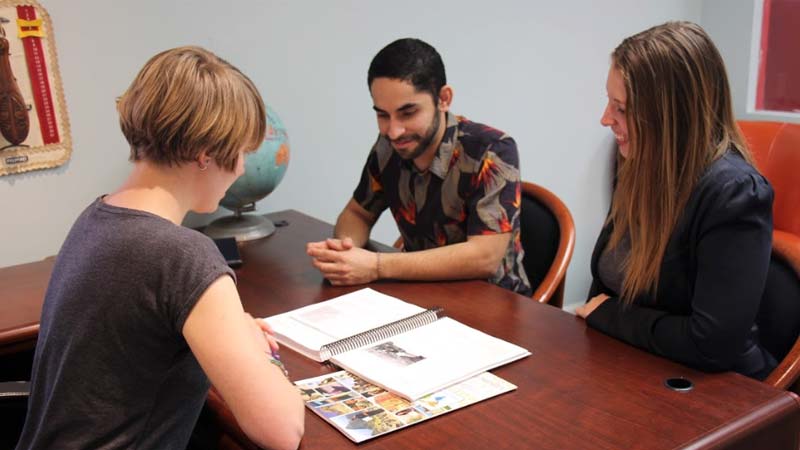Teaching English Abroad: Tips for Job Interviews on Phone and Skype
Written By: Shay Ames | Updated: June 29, 2023
Written By: Shay Ames
Updated: June 29, 2023

Top 11 Expert Tips for Interviewing for Jobs Teaching English Abroad over Skype and the Phone
Interviewing procedures and practice vary widely for jobs teaching English abroad. In some cases, you should expect to interview face-to-face with schools in the country where you wish to teach. In other cases, you will apply and interview for jobs in advance from home. This is typical for positions teaching English in the Arab Gulf countries, China, South Korea, Taiwan, Indonesia, European countries like Turkey and Russia, and some Latin American countries (Chile, Colombia, and Mexico, in particular). Such interviews are typically conducted over the phone and/or by Skype. As in any job interview, you want to do the best possible job in selling your qualifications, presenting yourself as a professional and convincing your potential employer that you are the best possible person for the job, but here are some particular points to help you master interviews for teaching English abroad conducted over Skype and the phone.
1. Get TEFL Certified!

There is nothing more that will qualify you more for positions teaching English abroad than earning an accredited TEFL certification. In addition, you want to provide a strong answer when any potential employer asked you about your qualifications to teach professionally.
You should also expect to be asked questions about teaching practices and experience, which you will gain through an accredited TEFL course that includes a practicum (live practice teaching with actual ESL students, not role-playing).
2. Explore Your Options & Be Flexible
Be flexible and don’t sweat not knowingly exactly where you will go before getting on your way abroad. Applying for teaching jobs in advance enables you to pursue multiple opportunities in multiple countries without committing to one until you have found the best fit for you.
3. Get the ball rolling!
On average, for advance interviews you should allow for two to four months from the beginning of the interview process to the start date of your job. While there may be exceptions, this procedure is standard for schools in the Arab Gulf countries, China, South Korea, Taiwan, Indonesia, European countries like Turkey and Russia, and some Latin American countries.
NOTE: If you take the part time, 3 month 170-Hour Online TEFL Certification Class from International TEFL Academy, you will begin receiving Job Search Guidance during your course, so you can begin the process of preparing your documents, putting together you cover letter and resume, and even beginning the interview process with schools and recruiters.
If you take a four-week in-person TEFL Class, you can begin receiving Job Search Guidance once you have enrolled in your TEFL class.

4. Set Up Professional Email Accounts
Set up at least two professional email accounts and include them on all correspondence in case one filters out or blocks important correspondence. Get a non-work or university account. JamesDavis@gmail.com is professional. JimmyboomboomDJRapper@gmail.com is not going to get you a job.
Also, be sure to check your “junk” mail folders frequently when you beginning corresponding with schools or recruiters in case emails are being directed into those folders.
5. Looking professional for a video interview
The benefit of a video interview on Skype or other programs is the interviewer can look you in the eye and see how you hold yourself. They want to see if you are neatly dressed, professional looking, if you have a tattoo on your forehead, etc.
Here's the big tip: Dress for success! Put on a nice interview outfit, that means a suit and tie for a man and a nice dress blouse or suit jacket for a woman. It's a real interview so be in a quiet place with good lighting and have a headphone ready to keep the noise level down.

6. Provide a Reliable Mailing Address
It is important to have a reliable mailing address that is consistent for the duration of your job search abroad. If you plan to move during your job search, gain permission from your parents, relatives, or friends to use one of their addresses.
7. Be aware of Time Zones & Time Differences
When making calls and corresponding with recruiters and prospective employers, always bear in mind any differences between your location and that of the corresponding party. When setting up an interview or other phone conversation, always confirm in writing (email) the time zone for both of you so there is no mistake. Try to be as accommodating as possible when arranging interviews with potential employers in different time zones. This happens every day in interviewing and in the business world. When in doubt, use Google.
8. Make Sure Your Personal Voice Mail Sounds Professional and Mature
No music, no movie quotes, no funny voices, no smart-alec comments, and no joking. If you have an alternate telephone number or pager that you want someone to call, include it in the message. An example greeting could be:
“Hi, this is Mike Davis. I am not available at this time. Please feel free to leave a message at the sound of the beep. I can also be reached on my cell phone at (212) 555-5555. Thank you for calling.”
The same goes for your Skype profile picture or avatar - make sure it presents you in a professional and respectable manner. You don't want a school director from South Korea or Saudi Arabia to be greeted with a photo of Bob Marley or you doing keg stands during spring break when they Skype you for an interview.

9. Be Prepared to Answer the Right Questions
As in any interview you need to be ready to answer questions about your teaching experience and training, your personal and professional background, and why you want this job.
Typical questions may include:
-
What are your strengths and weaknesses as a teacher?
-
How would you introduce the past simple tense to a group of 10 adult students?
-
Tell me about your previous jobs. Why did you leave? (Note: avoid speaking ill of past employers.)
-
What ages and levels of students have you taught in the past?
-
How would you handle with a class of students of mixed abilities?
-
Why are you interested in teaching in (name of country where school is located)? Showing some interest and knowledge of the country will definitely help, but avoid bringing up sensitive matters like politics.
-
Have you lived or traveled abroad before?
-
How do you feel about working split shifts and weekends?
-
Can you prepare your own materials and/or develop your own curriculum?

10. Be Prepared to Ask Questions
Undoubtedly you will have questions for your potential employer and there will be important matters regarding any job that you will want to confirm and clarify. Also, asking questions will also indicate to them that you are serious about the job. Ask all of the questions you need to have answered in order to feel comfortable and confident before accepting a job.
-
Are there other foreign teachers working at the school?
-
Are they unprepared to put you in contact with current can answer your questions about working at that school?
-
Are they expecting you to accept a job offer without seeing a contract?
-
Are they asking you to send them money? (There should be no reason for this).
-
What are the working days and working hours? (Will I be expected Saturdays or weekends?)
-
How many contact teaching hours will I be expected to do? (20 to 25 a week is common with 12-15 hours of lesson planning. 40 contact hours a week can be common in language schools in Japan but typically no prep time needed.)
-
Will I be paid overtime if I teach more than this number of hours? (If so, when is it paid and is it compulsory?)
-
What non-teaching tasks will I be required to undertake? (Administrative, creating materials, marking, placement testing of students)
-
What is my salary? (This should not be the first question you ask.)
-
Will there be opportunities for a raise in the future?
-
When and how is it paid? Is there an end of contract bonus? (What are the conditions under which this is paid?)
-
Is there a dress code and if so, what is it?
-
Is housing provided, and if not, do you assist new teachers with finding housing.
-
If housing is provided, ask if you can see photos of possible housing arrangements and ask what is included in the way of furnishings and utilities.
-
Will a work visa be sponsored, and if so, how will the school provide assistance and what documents will be required?
11. Ask for a Job Description/Contract in Writing
Before accepting any job, make sure that you receive a contract and/or job description that clearly outlines terms employment like salary, benefits and workload expectations before accepting a job offer. International TEFL Academy students and graduates can ask for advice and assistance from experienced job search advisors with reviewing contracts and job offers.
Posted In: Teach English in Asia, Teach English in Middle East, Job Search Guidance, Teach English in Latin America, Teach English in Europe
Shay Ames
A senior Admissions Advisor with International TEFL Academy, Shay Ames has more than 12 years of high-level professional experience working in the fields of teaching English abroad & TEFL certification. In addition to personally helping more than 1,000 ITA students achieve their goals of teaching overseas, Shay has published numerous articles on the topics of teaching English abroad & TEFL certification. He also works extensively to build partnerships between International TEFL Academy and major institutions throughout international education.
Want to Learn More About Teaching English Abroad & Online?
Request a free brochure or call 773-634-9900 to speak with an expert advisor about all aspects of TEFL certification and teaching English abroad or online, including the hiring process, salaries, visas, TEFL class options, job placement assistance and more.










